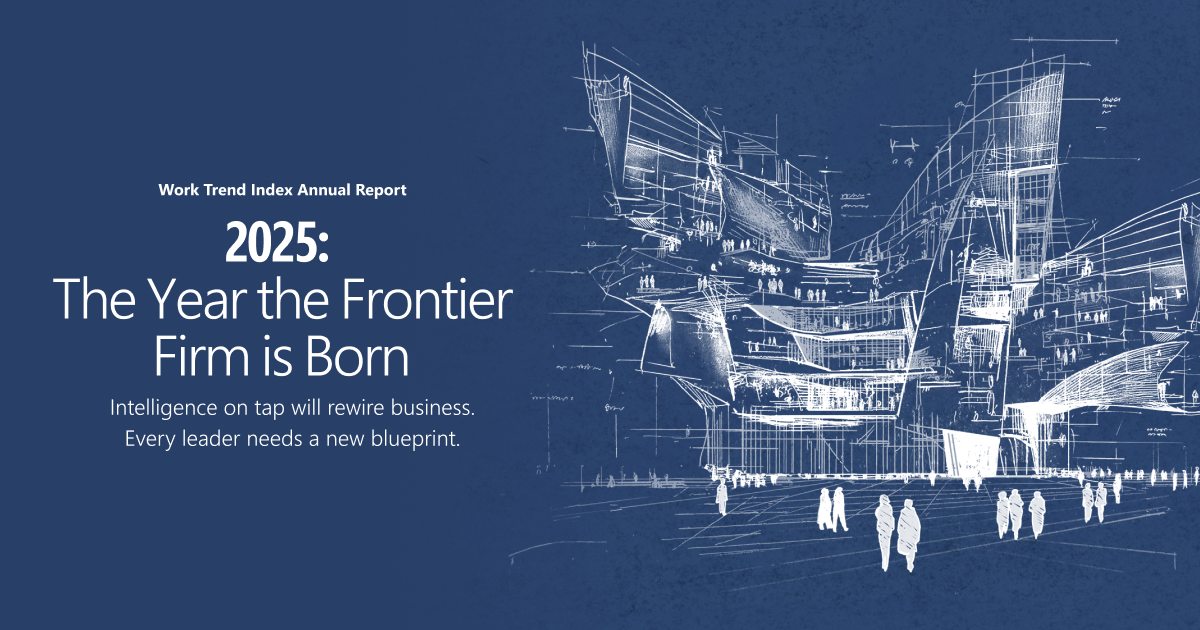- AI Strategist News
- Posts
- AI Weekly News Update: 04/28/2025
AI Weekly News Update: 04/28/2025
AI Strategist News: Navigating the transformative world of AI for your business

Table of Contents
This Week
Bottom Line Up Front
The emergence of AI-powered systems, or "agents," is transforming the business landscape, enabling companies to scale capacity and increase productivity.
A new organizational model, known as the "Frontier Firm," is emerging, characterized by the integration of human and machine intelligence, and is expected to become the norm within 2-5 years.
The journey to becoming a Frontier Firm involves three phases: AI as an assistant, AI as a "digital colleague," and AI running entire business processes, with humans providing oversight and direction.
The traditional org chart may be replaced by a dynamic Work Chart, where teams form around goals and are powered by AI agents that enable faster and more impactful ways of working.
Business Use Cases
Bottom Line Up Front
Microsoft has collected over 261 new customer stories showcasing how organizations are using AI to drive business value, with an average return of $3.70 for every $1 invested in generative AI.
The majority of transformation initiatives are designed to achieve one of four business outcomes:
Enriching employee experiences
Reinventing customer engagement
Reshaping business processes
Bending the curve on innovation.
Why is this important
AI is disrupting every part of life, including the classroom, where students can use tools like Chat GPT to complete homework and essays, making it difficult for teachers to grade assignments and pushing students to use these tools to keep up with their peers.
The use of AI in education is forcing a re-examination of the purpose of education and the education system, with experts like Maryann Wolf and Rebecca Winthrop considering the impact of technology on learning and the potential for a "Faustian bargain" where something of deep moral importance is given up in exchange for something of material importance.
The discussion highlights the importance of developing critical thinking skills, such as deep reading, analogical thinking, and inferential skills, which are essential for learners to become critically analytic and are potentially threatened by the use of AI and other technologies that can shortcut the learning process.
Intentional introduction of technology into education is crucial, as it will not automatically improve things, and reading skills are better developed with print than on devices during pivotal times.
Bottom Line Up Front
The nature of work is going to change fundamentally with the advancement of AI, and people should be prepared for it, but not necessarily worried about AI taking their jobs. However, people should be prepared for this transformation, which will affect how we work, what we do, and where we live.
AI models are becoming more efficient and capable, with the ability to generate high-quality data synthetically, and their development is expected to continue with larger models, more compute, and new techniques.
The concept of "hallucinations" in AI models is not a long-term problem, but rather a sign of their ability to adapt and generate new information, and they are becoming easier to control and steer as they get bigger.
The definition of Artificial General Intelligence (AGI) is still fuzzy, but one possible definition is the ability to perform well across a wide range of environments, with an emphasis on generality and high-quality performance, possibly at or exceeding human level.
The concept of Artificial Super Intelligence (ASI) is difficult to define and predict, but it's essential to consider the specific capabilities that need to be accelerated and engineered into models, as well as those that could have powerful consequences if mishandled.
PRESENTED BY HeyReach
10x your LinkedIn outbound. Unlimited senders, one fixed cost
For agencies, sales teams, and GTM experts who want to automate LinkedIn outreach, reach 1000+ leads weekly, and book more meetings.
Things to Pay Attention to
Bottom Line Up Front
China's President Xi Jinping has called for "self-reliance and self-strengthening" in AI development to compete with the US.
Xi emphasized the need to advance technological innovation, industrial development, and AI-empowered applications, with policy support in areas like government procurement and intellectual property rights.
The goal is to build an independent and controllable AI system, with a focus on mastering core technologies like high-end chips and basic software, and establishing AI regulations and laws for safety and reliability.
Bottom Line Up Front
The author, Dario Amodei, has been working on AI for a decade and has learned that while the progress of the underlying technology is unstoppable, the way it is developed and applied can be influenced to have a positive impact on the world.
Amodei believes that one crucial aspect of steering the development of AI in a positive direction is achieving interpretability, which refers to understanding the inner workings of AI systems, and that recent advances have made this goal seem more achievable.
The lack of understanding of how AI systems work is unprecedented in the history of technology, and Amodei notes that people outside the field are often surprised and alarmed by this fact, which is a concern that needs to be addressed.
The concept of interpretability in AI models is crucial as it acts as an independent check on the alignment of models, similar to how a test set functions, and should be treated with the same care as a hidden evaluation or test set to maintain its independence and reliability.
Bottom Line Up Front
Geoffrey Hinton, a Nobel Prize winner, believes the world is not prepared for the rapid progress of artificial intelligence, which could transform education and medicine, but also poses significant risks, including a 10 to 20% risk of AI taking over from humans.
Hinton's work on neural networks, which began decades ago, has contributed to the development of large language models, and he predicts that AI will have a significant impact on various sectors, including climate change, but mostly worries about its potential to make authoritarians more oppressive and hackers more effective.
Hinton criticizes companies like Google, Meta, and XAI for prioritizing short-term profits over safety research, and believes that government regulation is needed to mitigate the risks associated with AI, but does not expect it to happen soon.
Bottom Line Up Front
Palantir's AI applications are sold across both the public and private sectors, with large corporations using the platform to organize data and synthesize it into actionable insights, and government agencies, such as the Department of Defense (DOD), using it for military and stealth operations.
The partnership with NATO, a coalition of 32 member nations, including 30 European countries, Canada, and the US, who have agreed to defend one another militarily, could be a game changer for how AI is deployed in the public sector, and Palantir is well-positioned to take advantage of the public sector's interest in AI, given its heavy reliance on government contracts and its existing presence in the US and other countries.
The deal with NATO has the potential to supercharge Palantir's growth, as the company is already a leading provider of AI software applications to the public sector, and this partnership could lead to further adoption of its technology by other government agencies and organizations, both domestically and internationally.
Your opinion matters! Your feedback helps me create better emails for you! Loved it 😍 😍 😍 Ok 🫤 Horrible 🤢 Got more feedback or just want to get in touch? Reply to this email and we’ll get back to you. _________________________________________________________________ Thanks for reading. Until next time! Layla and AI Strategist News Team |
|
Buy me a coffee






